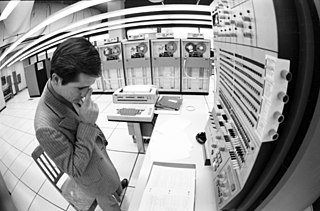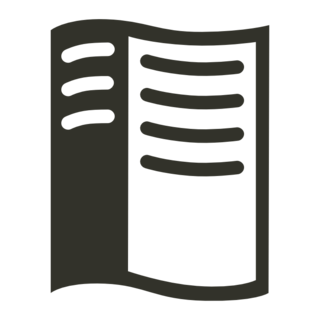
The Apache HTTP Server is a free and open-source cross-platform web server software, released under the terms of Apache License 2.0. Apache is developed and maintained by an open community of developers under the auspices of the Apache Software Foundation.

Free software or libre software, infrequently known as freedom-respecting software, is computer software distributed under terms that allow users to run the software for any purpose as well as to study, change, and distribute it and any adapted versions. Free software is a matter of liberty, not price; all users are legally free to do what they want with their copies of a free software regardless of how much is paid to obtain the program. Computer programs are deemed "free" if they give end-users ultimate control over the software and, subsequently, over their devices.
The free software movement is a social movement with the goal of obtaining and guaranteeing certain freedoms for software users, namely the freedoms to run the software, to study the software, to modify the software, and to share copies of the software. Software which meets these requirements, The Four Essential Freedoms of Free Software, is termed free software.

GNU is an extensive collection of free software, which can be used as an operating system or can be used in parts with other operating systems. The use of the completed GNU tools led to the family of operating systems popularly known as Linux. Most of GNU is licensed under the GNU Project's own General Public License (GPL).

Open-source software (OSS) is computer software that is released under a license in which the copyright holder grants users the rights to use, study, change, and distribute the software and its source code to anyone and for any purpose. Open-source software may be developed in a collaborative public manner. Open-source software is a prominent example of open collaboration, meaning any capable user is able to participate online in development, making the number of possible contributors indefinite. The ability to examine the code facilitates public trust in the software.
The Filesystem Hierarchy Standard (FHS) is a reference describing the conventions used for the layout of a UNIX system. It has been made popular by its use in Linux distributions, but it is used by other UNIX variants as well. It is maintained by the Linux Foundation. The latest version is 3.0, released on 3 June 2015.
In the context of free and open-source software, proprietary software only available as a binary executable is referred to as a blob or binary blob. The term usually refers to a device driver module loaded into the kernel of an open-source operating system, and is sometimes also applied to code running outside the kernel, such as system firmware images, microcode updates, or userland programs. The term blob was first used in database management systems to describe a collection of binary data stored as a single entity.

FreeBSD is a free and open-source Unix-like operating system descended from the Berkeley Software Distribution (BSD), which was based on Research Unix. The first version of FreeBSD was released in 1993. In 2005, FreeBSD was the most popular open-source BSD operating system, accounting for more than three-quarters of all installed and permissively licensed BSD systems.

The Linux Foundation (LF) is a non-profit technology consortium founded in 2000 as a merger between Open Source Development Labs and the Free Standards Group to standardize Linux, support its growth, and promote its commercial adoption. Additionally, it hosts and promotes the collaborative development of open source software projects. It is a major force in promoting diversity and inclusion in both Linux and the wider open source software community.

In the 1950s and 1960s, computer operating software and compilers were delivered as a part of hardware purchases without separate fees. At the time, source code, the human-readable form of software, was generally distributed with the software providing the ability to fix bugs or add new functions. Universities were early adopters of computing technology. Many of the modifications developed by universities were openly shared, in keeping with the academic principles of sharing knowledge, and organizations sprung up to facilitate sharing. As large-scale operating systems matured, fewer organizations allowed modifications to the operating software, and eventually such operating systems were closed to modification. However, utilities and other added-function applications are still shared and new organizations have been formed to promote the sharing of software.
Automata-based programming is a programming technology. Its defining characteristic is the use of finite state machines to describe program behavior. The transition graphs of state machines are used in all stages of software development. Automata-based programming technology was introduced by Anatoly Shalyto in 1991. Switch-technology was developed to support automata-based programming. Automata-based programming is considered to be rather general purpose program development methodology than just another one finite state machine implementation.
Companies whose business centers on the development of open-source software employ a variety of business models to solve the challenge of how to make money providing software that is by definition licensed free of charge. Each of these business strategies rests on the premise that users of open-source technologies are willing to purchase additional software features under proprietary licenses, or purchase other services or elements of value that complement the open-source software that is core to the business. This additional value can be, but not limited to, enterprise-grade features and up-time guarantees to satisfy business or compliance requirements, performance and efficiency gains by features not yet available in the open source version, legal protection, or professional support/training/consulting that are typical of proprietary software applications.
The open-source-software movement is a movement that supports the use of open-source licenses for some or all software, as part of the broader notion of open collaboration. The open-source movement was started to spread the concept/idea of open-source software. Programmers who support the open-source-movement philosophy contribute to the open-source community by voluntarily writing and exchanging programming code for software development. The term "open source" requires that no one can discriminate against a group in not sharing the edited code or hinder others from editing their already-edited work. This approach to software development allows anyone to obtain and modify open-source code. These modifications are distributed back to the developers within the open-source community of people who are working with the software. In this way, the identities of all individuals participating in code modification are disclosed and the transformation of the code is documented over time. This method makes it difficult to establish ownership of a particular bit of code but is in keeping with the open-source-movement philosophy. These goals promote the production of high-quality programs as well as working cooperatively with other similarly-minded people to improve open-source technology.

OpenStack is a free, open standard cloud computing platform. It is mostly deployed as infrastructure-as-a-service (IaaS) in both public and private clouds where virtual servers and other resources are made available to users. The software platform consists of interrelated components that control diverse, multi-vendor hardware pools of processing, storage, and networking resources throughout a data center. Users manage it either through a web-based dashboard, through command-line tools, or through RESTful web services.

The Yocto Project is a Linux Foundation collaborative open source project whose goal is to produce tools and processes that enable the creation of Linux distributions for embedded and IoT software that are independent of the underlying architecture of the embedded hardware. The project was announced by the Linux Foundation in 2010 and launched in March, 2011, in collaboration with 22 organizations, including OpenEmbedded.
Ansible is a suite of software tools that enables infrastructure as code. It is open-source and the suite includes software provisioning, configuration management, and application deployment functionality.

Outreachy (previously the Free and Open Source Software Outreach Program for Women) is a program that organizes three-month paid internships with free and open-source software projects for people who are typically underrepresented in those projects. The program is organized by the Software Freedom Conservancy and was formerly organized by The GNOME Project and the GNOME Foundation.

Read the Docs is an open-sourced free software documentation hosting platform. It generates documentation written with the Sphinx documentation generator. The site was created in 2010 by Eric Holscher, Bobby Grace, and Charles Leifer.

Clear Linux OS is a Linux distribution, developed and maintained on Intel's 01.org open-source platform, and optimized for Intel's microprocessors with an emphasis on performance and security. Its optimizations also affect AMD-systems. Clear Linux OS follows a rolling release model. Clear Linux OS is not intended to be a general-purpose Linux distribution; it is designed to be used by IT professionals for DevOps, AI application development, cloud computing, and containers. It is currently the fastest available Linux implementation.












